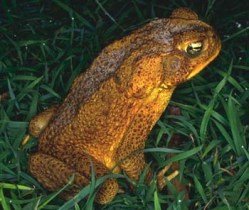 An open letter to Penny Cook National Trust
You may wish to keep them but they are a bloody pest.
Cane Toads have large glands upon their shoulders which contain poison. Many animals have died from this poison when they have tried to eat a Cane Toad. Eggs, tadpoles, juvenile and adult toads are all poisonous.
Cane Toads are considered a pest in Australia because they:
Poison pets and injure humans with their toxins
Poison many native animals whose diet includes frogs, tadpoles and frogs' eggs
Eat large numbers of honey bees, creating a management problem for bee-keepers
Prey on native fauna
Compete for food with vertebrate insectivores such as small skinks (a small lizard) etc
Are you that anxious to keep your job wishing them to be our national icon?
Our erstwhile Premier Beatty wishes them to be historical icons as IN GONE as do most Queenslanders and I am inclined to agree with him.
I notice in this link I read that one hops by your door every night; I presume you are joking as I see lots of them most nights stealing pet food; the things will eat anything; you Maam are out of your cotton picking mind wake up to yourself.
Not only that you are exporting them to other states without a permit I might add; think hard on this NSW is sick of them and now it seems they are
in Western Australia; they are definitely in the Northern Territory in large numbers.
Some have been deliberately released some may have made the lengthy trips by truck it is not certain I know snakes get carried to the south by truck.
They were imported from Hawaii for the cane fields of Queensland but it was soon found to be a bloody pest.
How the Hawaiians cope with them I don’t know but don’t waste the taxpayers hard come by cash to find out a simple letter will be enough I think even then it will only prove what we already know.
Of course Queenslanders are different but not to the extent of having these pests in the state we are all sick of them and they are more numerous up in the tropical areas.
An open letter to Penny Cook National Trust
You may wish to keep them but they are a bloody pest.
Cane Toads have large glands upon their shoulders which contain poison. Many animals have died from this poison when they have tried to eat a Cane Toad. Eggs, tadpoles, juvenile and adult toads are all poisonous.
Cane Toads are considered a pest in Australia because they:
Poison pets and injure humans with their toxins
Poison many native animals whose diet includes frogs, tadpoles and frogs' eggs
Eat large numbers of honey bees, creating a management problem for bee-keepers
Prey on native fauna
Compete for food with vertebrate insectivores such as small skinks (a small lizard) etc
Are you that anxious to keep your job wishing them to be our national icon?
Our erstwhile Premier Beatty wishes them to be historical icons as IN GONE as do most Queenslanders and I am inclined to agree with him.
I notice in this link I read that one hops by your door every night; I presume you are joking as I see lots of them most nights stealing pet food; the things will eat anything; you Maam are out of your cotton picking mind wake up to yourself.
Not only that you are exporting them to other states without a permit I might add; think hard on this NSW is sick of them and now it seems they are
in Western Australia; they are definitely in the Northern Territory in large numbers.
Some have been deliberately released some may have made the lengthy trips by truck it is not certain I know snakes get carried to the south by truck.
They were imported from Hawaii for the cane fields of Queensland but it was soon found to be a bloody pest.
How the Hawaiians cope with them I don’t know but don’t waste the taxpayers hard come by cash to find out a simple letter will be enough I think even then it will only prove what we already know.
Of course Queenslanders are different but not to the extent of having these pests in the state we are all sick of them and they are more numerous up in the tropical areas.
9.6.06
An open letter to Penny Cook National Trust
 An open letter to Penny Cook National Trust
You may wish to keep them but they are a bloody pest.
Cane Toads have large glands upon their shoulders which contain poison. Many animals have died from this poison when they have tried to eat a Cane Toad. Eggs, tadpoles, juvenile and adult toads are all poisonous.
Cane Toads are considered a pest in Australia because they:
Poison pets and injure humans with their toxins
Poison many native animals whose diet includes frogs, tadpoles and frogs' eggs
Eat large numbers of honey bees, creating a management problem for bee-keepers
Prey on native fauna
Compete for food with vertebrate insectivores such as small skinks (a small lizard) etc
Are you that anxious to keep your job wishing them to be our national icon?
Our erstwhile Premier Beatty wishes them to be historical icons as IN GONE as do most Queenslanders and I am inclined to agree with him.
I notice in this link I read that one hops by your door every night; I presume you are joking as I see lots of them most nights stealing pet food; the things will eat anything; you Maam are out of your cotton picking mind wake up to yourself.
Not only that you are exporting them to other states without a permit I might add; think hard on this NSW is sick of them and now it seems they are
in Western Australia; they are definitely in the Northern Territory in large numbers.
Some have been deliberately released some may have made the lengthy trips by truck it is not certain I know snakes get carried to the south by truck.
They were imported from Hawaii for the cane fields of Queensland but it was soon found to be a bloody pest.
How the Hawaiians cope with them I don’t know but don’t waste the taxpayers hard come by cash to find out a simple letter will be enough I think even then it will only prove what we already know.
Of course Queenslanders are different but not to the extent of having these pests in the state we are all sick of them and they are more numerous up in the tropical areas.
An open letter to Penny Cook National Trust
You may wish to keep them but they are a bloody pest.
Cane Toads have large glands upon their shoulders which contain poison. Many animals have died from this poison when they have tried to eat a Cane Toad. Eggs, tadpoles, juvenile and adult toads are all poisonous.
Cane Toads are considered a pest in Australia because they:
Poison pets and injure humans with their toxins
Poison many native animals whose diet includes frogs, tadpoles and frogs' eggs
Eat large numbers of honey bees, creating a management problem for bee-keepers
Prey on native fauna
Compete for food with vertebrate insectivores such as small skinks (a small lizard) etc
Are you that anxious to keep your job wishing them to be our national icon?
Our erstwhile Premier Beatty wishes them to be historical icons as IN GONE as do most Queenslanders and I am inclined to agree with him.
I notice in this link I read that one hops by your door every night; I presume you are joking as I see lots of them most nights stealing pet food; the things will eat anything; you Maam are out of your cotton picking mind wake up to yourself.
Not only that you are exporting them to other states without a permit I might add; think hard on this NSW is sick of them and now it seems they are
in Western Australia; they are definitely in the Northern Territory in large numbers.
Some have been deliberately released some may have made the lengthy trips by truck it is not certain I know snakes get carried to the south by truck.
They were imported from Hawaii for the cane fields of Queensland but it was soon found to be a bloody pest.
How the Hawaiians cope with them I don’t know but don’t waste the taxpayers hard come by cash to find out a simple letter will be enough I think even then it will only prove what we already know.
Of course Queenslanders are different but not to the extent of having these pests in the state we are all sick of them and they are more numerous up in the tropical areas.
Subscribe to:
Post Comments (Atom)











No comments:
Post a Comment